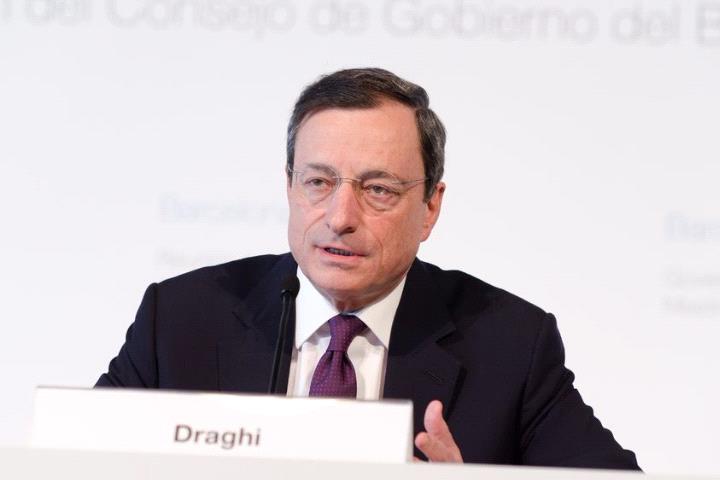
Mario Draghi hasn’t flinched since the Brexit vote. This week he’ll get the strongest clues yet whether he’s right to keep calm and carry on. Business confidence in Germany -- which was barely dented in July -- may help reassure the European Central Bank president as he scans for potential cracks in the outlook. An initial estimate of second-quarter gross domestic product will provide insight into the economy’s momentum before the Brexit shock at the end of June. As ECB economists gather data for new forecasts for policy makers’ meeting in September, Draghi has said early estimates of the economic impact of Britain’s decision to leave the European Union need to be taken with a “grain of caution.” While he argued the vote hasn’t had a major effect on the inflation outlook so far, the institution is still primed to unleash further stimulus if necessary. “It’s too early to assess all the possible ramifications for the euro zone,” said Marco Valli, chief euro-zone economist at Unicredit Bank AG in Milan, who has downgraded his 2016 growth projections for both the euro area and the U.K. “What’s clear is that uncertainty is here to stay even if the euro zone has contained the damage.” On Monday, some extra visibility was provided by Germany, the region’s largest economy, with the closely-watched Ifo survey falling to 108.3 in July -- less than predicted by economists. A measure of investor sentiment last week pointed to early signs of strain, falling to the lowest since 2012. A Markit survey on Friday showed a “marginal easing” in the pace of euro-region expansion in July. Nevertheless, while the gauges for services and manufacturing declined, they still signaled modest growth in the 19-nation bloc. Since Brexit, the International Monetary Fund has become less optimistic on global growth. With trade relations between the U.K. and the EU on the line, some of Europe’s big-name companies -- from chemical firm BASF SE to automaker Peugeot -- may give a practical view on the outlook for the bloc’s economy when they report earnings this week. Ryanair Holdings Plc said Monday the vote result will lead to a “considerable period of political and economic uncertainty in both the U.K. and the EU,” damaging growth and consumer confidence. Amid the gloomier global outlook, Friday’s first estimate for second-quarter euro-region GDP growth will help give a clearer sense of momentum in the run-up to Britain’s vote, and the challenges going forward. Economists in a Bloomberg survey see a slowdown to 0.3 percent from 0.6 percent after the first quarter was boosted by one-offs and seasonal effects. U.K. GDP on Wednesday is forecast to come in at 0.5 percent, though a contraction is projected this quarter and next. “If you’re seeing weakness in the euro zone even in the second quarter, there might be concerns that an extra headwind from Brexit-related uncertainty will keep growth and underlying inflation pressures quite subdued,” said Nick Kounis, head of macroeconomic research at ABN Amro in Amsterdam. “That could set the case for further ECB action over time.” Data on Friday is forecast to show euro-zone consumer-price growth stuck at 0.1 percent in July, far below the ECB’s goal of close to 2 percent. Even with the Brexit effect, Draghi said on July 21 that inflation expectations remained “pretty anchored,” and he forecasts a pickup from later this year. GDP figures from France, Spain, Belgium and Austria may reinforce the divergence across the region, while there’s also unemployment data in Italy and Spain to digest. Inflation and economic growth aren’t Draghi’s only concerns. His home country of Italy has come under renewed market pressure over concerns about its financial system and the level of banks’ bad loans. With new EU stress tests due late on Friday, Bank of America Merrill Lynch says it’s “all eyes on Italian banks.” The ECB president said last week that the issue must addressed and even endorsed a public backstop to speed up a solution. Measures of sentiment in Italy are due on Wednesday, with consumer confidence in the euro area’s third-biggest economy forecast to fall to the lowest in a year. Economic confidence for the 19-nation region, released the next day, may drop to a four-month low, according to a survey of economists. Overhanging all of that is Brexit, with uncertainty over issues including what a new U.K.-EU relationship will look like, how trade deals will operate and even when the negotiations over the actual exit will begin. “This is still a major risk,” Christian Schulz, European economist at Citigroup, told Bloomberg Television. “For the U.K., European and global economy.” Bloomberg



 UK's Jaguar Land Rover to halt US shipments over tariffs
UK's Jaguar Land Rover to halt US shipments over tariffs
 US starts collecting Trump's new 10% tariff
US starts collecting Trump's new 10% tariff
 Nasdaq set to confirm bear market as Trump tariffs trigger recession fears
Nasdaq set to confirm bear market as Trump tariffs trigger recession fears
 Dana Gas and Crescent Petroleum exceed 500M boe in Khor Mor field
Dana Gas and Crescent Petroleum exceed 500M boe in Khor Mor field




